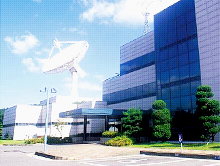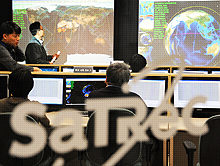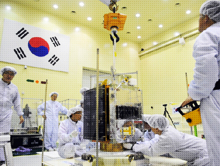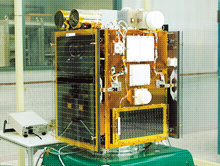Home > Research and Development > STSAT Series > STSAT-3
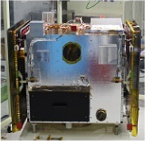
∎ STSAT-3
The STSAT-3 is a low Earth orbit satellite used for space observation and space technology verification in a sun-synchronous orbit of altitude 600km. The main MIRIS (Multi-purpose Infra-Red Imaging System) payload conducts infrared observation of the earth and space while the sub-payload, COMIS (COMpact Imaging Spectrometer), monitors changes in the earth environment.
Additionally, STSAT-3 uses advanced space technologies such as lightweight composite materials, a Hall thruster, an array antenna, Lithium-Ion Batteries, and a multi-functional structure.
- To conduct cosmic infrared background observation and earth exploration
- To conduct infrared earth observation, atmosphere observation and environment monitoring
- To verify space technologies and conduct experiments to develop next-generation technologies
- To develop and test next-generation core space-based technology for application-level satellites
|
| Orbit |
inclination 98.18 ˚, altitude 700km (Sun-synchronousOrbit) |
| Weight |
170kg |
| Power Rating |
300W @ EOL |
| Attitude Control |
3-axis stabilization |
Communication
(Transfer Speed) |
S-band Uplink: 9.6kbps
S-band Downlink: 38.4kbps
X-band Downlink: 10Mbps
|
| Main Computer |
Leon3 |
| Core Technologies |
Li-Ion Battery
Multi-Functional Structure Made of Composite Materials
High Performance on-board Computer
Compact Solar Power Controller
Electrical Thruster
|
| Payloads |
Multi-purpose IR Imaging System (MIRIS)
COMpact Imaging Spectrometer (COMIS)
|
